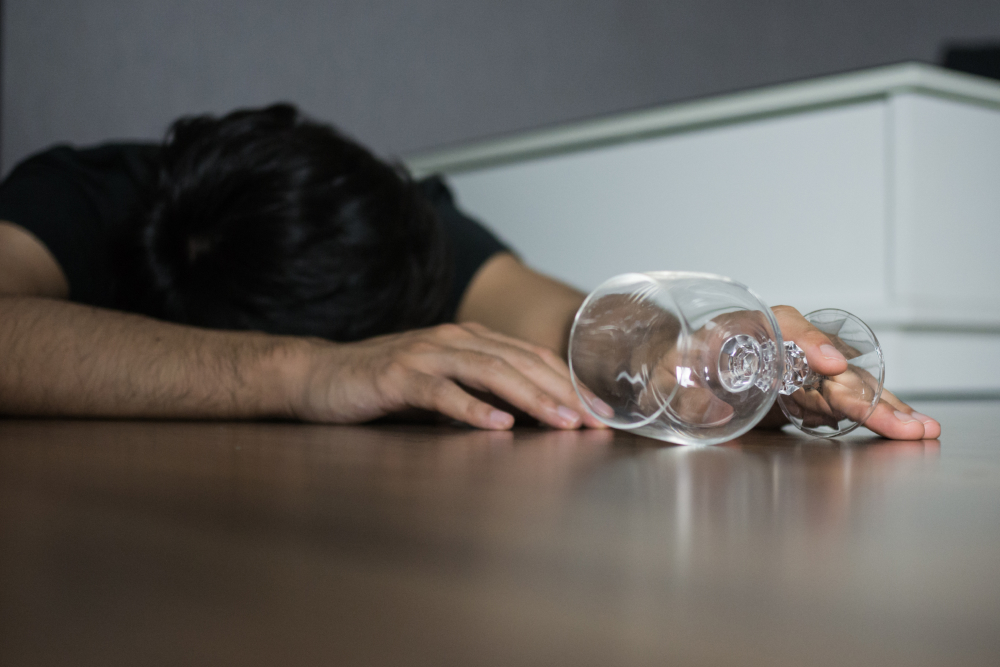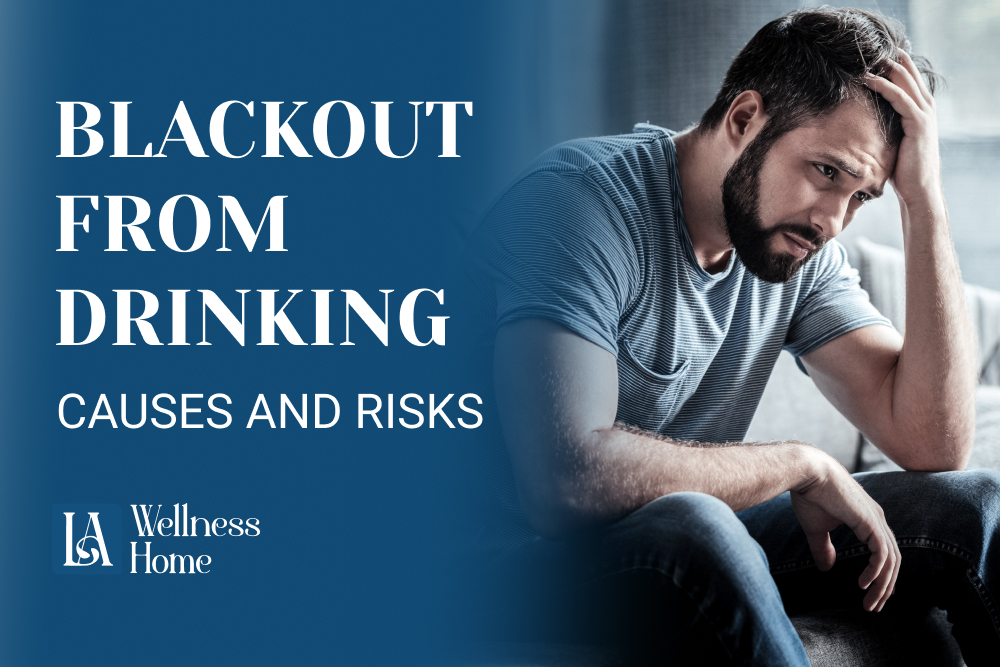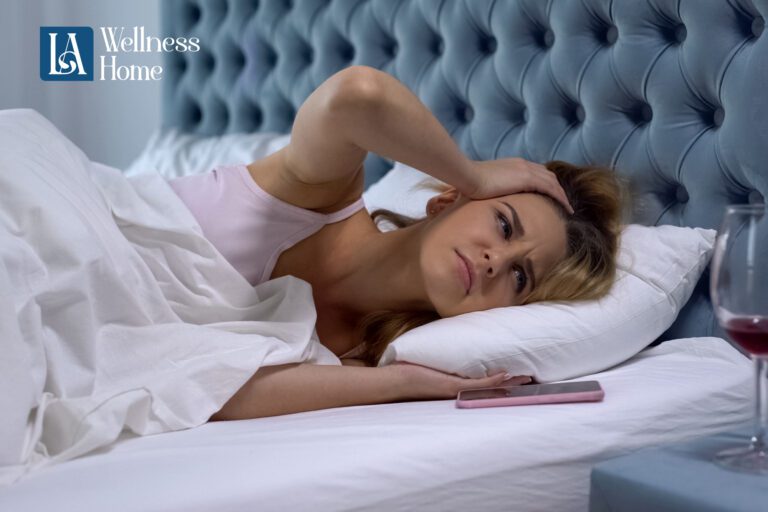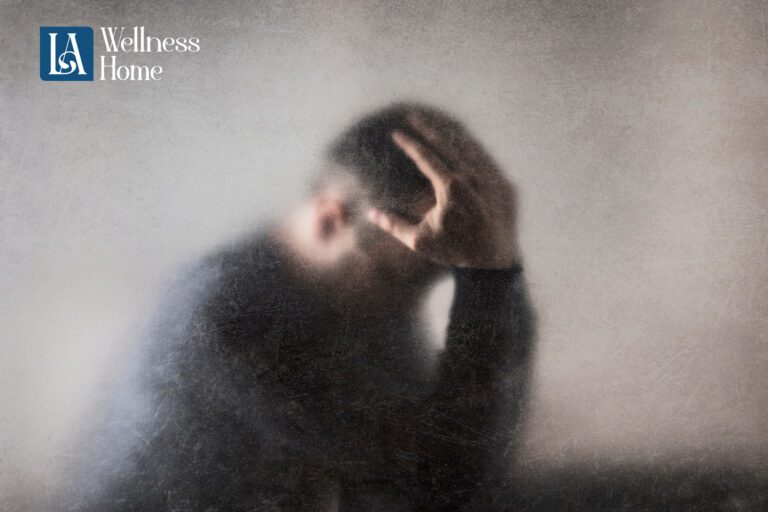Did you have one drink too many and can’t remember what happened on your night out? Or are your friends telling you about something you did while drunk but can’t recall doing so? You were probably blacked out drunk, which can be more serious than what you think.
In this post, we will discuss what an alcoholic blackout is and why it can be a sign that you need to seek help.
What happens when you blackout from drinking?

Alcohol-induced amnesia is what happens when you’re blackout drunk, meaning you experience memory loss because of heavy intoxication.
Aside from not having any recollection of what happened during intoxication, some people may also engage in dangerous activities. Others display unusual behavior, which they forget the morning after.
Medically speaking, a blackout from drinking is called anterograde amnesia. What happens is that your brain can’t form or store new memories. Experts believe that high levels of alcohol in your bloodstream change the way your brain receptors work temporarily.
Aside from that, taking certain medications with alcohol increases your risk of getting black out drunk. Some of these are drugs used to treat insomnia, like zolpidem. Also, marijuana and alcohol don’t mix well and can easily knock you down into a blacked-out state.
But overall, the more you drink alcohol, the higher the chance that you’ll experience this kind of memory loss.
Signs that you experienced an alcohol blackout
When someone blackouts from drinking, they won’t remember exactly what happened. Most of the time, it’s the people they are with that would confirm your alcohol blackout behavior.
Most of the time, it includes the following:
- Inability to walk or stand properly
- Sudden and erratic change of behavior while drunk
- Aggressive or irrational behavior
- Slurred speech
- Increased impulsiveness (engaging in dangerous activities)
- Delayed reactions
Overall, if you forget what you did or what happened while you’re drinking, then it’s probably got blackout drunk.
What causes alcohol blackouts?
Consuming large amounts of alcohol within a short period can lead to blacking out from drinking.
Drinking too quickly can also lead to blackout drunkenness. When your bloodstream is flooded with alcohol, you’ll get intoxicated fast. This will impair your senses and cognition.
On average, drinkers experience blacking out drunk when their blood alcohol concentration (BAC) reaches about .14% or .14. This is twice the legal limit, and anything higher would trigger far worse symptoms.
Still, some people with higher tolerance to alcohol may only experience ‘grayouts’ or ‘brownouts’, which are milder forms of blackouts
Aside from that, those who drink on an empty stomach also report experiencing blackouts from alcohol more often.
But overall, the possibility of blacking out from alcohol also depends on a person’s overall health.
The dangers of getting blackout drunk
There are many untoward incidents that could happen when blacking out while drunk. It serves as a cautionary tale to warn heavy drinkers about the actual dangers of extreme intoxication.
Here are some of these dangers to remind you to practice moderation as much as possible:
- Sustaining injuries. Experiencing a blackout when drinking will increase your risk of falling or getting into accidents. Also, your drunk blackout behavior may lead you to engage in dangerous activities like drunk driving.
- Engaging in illegal activities. Those who black out during drinking often have poor decision-making abilities. This means they could engage in illegal activities like vandalism, theft, trespassing, and so on.
- Causing harm to other people. There’s a possibility that you may also harm other people when you’re blackout drunk. You’re more likely to get into fights or cause life-threatening injuries to people around you.
- Having non-consensual sex. Some people, especially women, tend to be victims of non-consensual and unprotected sex when they are blacked out drunk. Others may take advantage of your lack of control when you’re heavily intoxicated with alcohol.
- Choking on your sleep. Take note that alcohol delays signals that regulate your gag reflex. If you happen to vomit while you’re blacked out and sleeping, you may end up choking on your own vomit.
- Developing health complications. If you always hit the ceiling on your blackout drunk BAC, your liver will start to suffer the consequences. Frequent heavy drinking increases your risk of heart disease, liver failure, stroke, and a slew of other diseases.
How to tell if someone is blackout drunk
A fun night out can turn into black-out drinking if you don’t want out your alcohol intake. So, if you’re going out with a friend, it’s worth looking after each other to spot these signs:
- Getting easily distracted
- Repeating the same sentences or questions
- Obvious signs of confusion about their surroundings
- Unsteady walking or inability to stand
- Constantly forgetting about what they just said or did
- Drinking large amounts of alcohol very quickly
- A sudden change in behavior that’s not typical to the person.
If you notice these signs when drinking out with a friend or someone else, it’s best to encourage them to call it a night. This way, the person will not get intoxicated even more or exposed to the potential dangers we’ve discussed above.
Is blacking out overdosing on alcohol?
What is blackout drunk, and is it the same as alcohol overdose? How about alcohol poisoning?
Blacking out from drinking too much alcohol isn’t necessarily an overdose or alcohol poisoning. However, it can be a symptom of both.
If a person has a low tolerance to alcohol or has reached a certain BAC, they may pass out and suffer from memory loss.
However, if the person has drunk too much alcohol and has way higher than normal BAC, it could lead to overdose or poisoning. Basically, the more a person gets ‘wasted’ with large amounts of alcohol, the more likely that they will suffer from life-threatening conditions.
So, what’s considered alcohol poisoning?
According to general BAC levels, a blood/breath alcohol concentration of 0.25 to 0.399 is already equivalent to alcohol poisoning. For some, a slightly lower range of 0.20 to 0.30 can be the tipping point for this life-threatening condition.
Take note that the number of drinks a person consumes isn’t a reliable basis for potential alcohol poisoning. A person’s body weight, gender, and body fat percentage are also at play here.
Nonetheless, it’s important to practice moderation whenever you’re drinking alcoholic beverages. Even if you feel like you have a higher alcohol tolerance, the effect of this substance on your health is undeniably real.
Is blackout drinking a sign of alcohol addiction?
Blacking out due to drinking isn’t directly a sign of alcohol addiction. Some people tend to have lower tolerance to alcohol, which may cause them to pass out easily just after a few shots.
While blackouts don’t necessarily point to alcohol use disorder, it’s still a matter of concern.
If you or someone you know always drinks to the point of blacking out, they should consider talking to an expert. You or your loved one can go through alcohol rehab before the excessive use of alcohol gets even worse.
Take note that the cycle of alcohol addiction often starts with binge drinking. At first, you may enjoy the ‘rewarding’ effect of alcohol, such as euphoria, lack of inhibitions, or being more sociable.
However, this same effect has a habit-forming nature, which means you’re going to drink repeatedly to achieve the same sensation.
Before you know it, your body has started to become dependent on alcohol, and you’ve lost control over your drinking habits.
Signs that your heavy drinking is already a problem
Since alcohol use disorder happens gradually, the signs may go unnoticed. But if you or a loved one is drinking alcohol regularly, these are the signs that it’s time to seek help from an addiction treatment center:
1. You’re spending too much time drinking.
A can, glass, or bottle of alcoholic drink isn’t bad once in a while. However, if you always have one in your hand almost every day, then your drinking might be a problem.
2. Your tolerance is increasing.
Have you noticed that you no longer get drunk fast, even when drinking large amounts of alcohol? This could be a sign that your body has adapted to the presence of alcohol and has become less sensitive to its effects.
3. You always crave alcohol.
If you always have the urge to get a drink so badly, you’re probably on the onset of alcohol use disorder. For some, this craving can develop into severe withdrawal symptoms.
4. It’s causing personal problems.
Your drinking is already a problem if it’s causing strain on your relationships. You should also start to be worried if a loved one is choosing to drink rather than taking care of their responsibilities.
5. Drinking is now your priority.
Spending more time on drinking or dropping other activities just to get your dose of alcohol is a sign that you need help. Also, if you enjoy drinking more than the activities you used to like, it might be time to get evaluated for alcohol dependence.
6. You’re getting sick.
If you’re still drinking despite developing alcohol-related health problems, then you probably need to seek help. Even alcoholics drinking in moderation aren’t safe from this danger.
7. Your drinking got you in legal trouble.
Did you recently get a DWI? This can be the start of future run-ins with the law if you don’t seek help for your drinking problem. Take note that you are putting your life and those on the road at risk.
Let our alcohol rehab help you. Contact LA Wellness Home today.
Having a few drinks with friends is a good way to unwind. However, if you’re frequently drinking too much to the point of blacking out, it might be the time to seek help.
At LA Wellness Home, we can help you beat alcoholism and alcohol dependence for good. Our inpatient alcohol rehab can help you fight cravings and withdrawal symptoms through healthy coping mechanisms.
We offer a 30-day program, on which the treatment duration may vary, depending on your needs. Our facility also accepts all major insurances to cover as much of your alcohol rehab costs as possible.
With our program, you can achieve recovery in a luxurious facility complete with a private chef, Sunday outings, and wellness activities. We believe that treatment doesn’t mean you’re going to miss out on the good things in life.
If you need help for yourself or a loved one struggling with alcohol use disorder, LA Wellness Home is here to listen. Feel free to call our 24/7 hotline or fill out our website form to get started.




